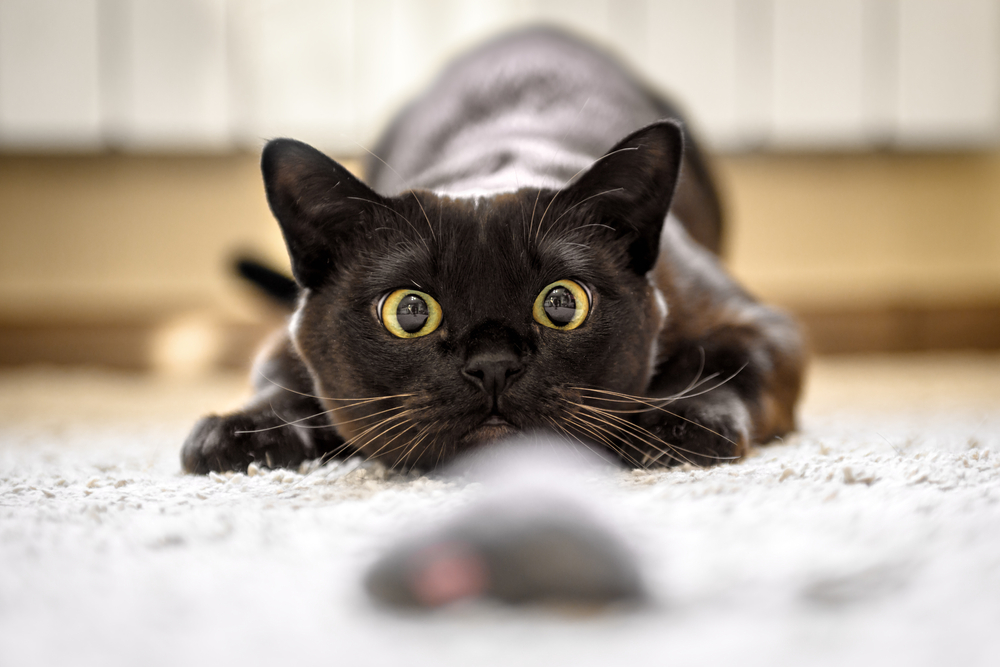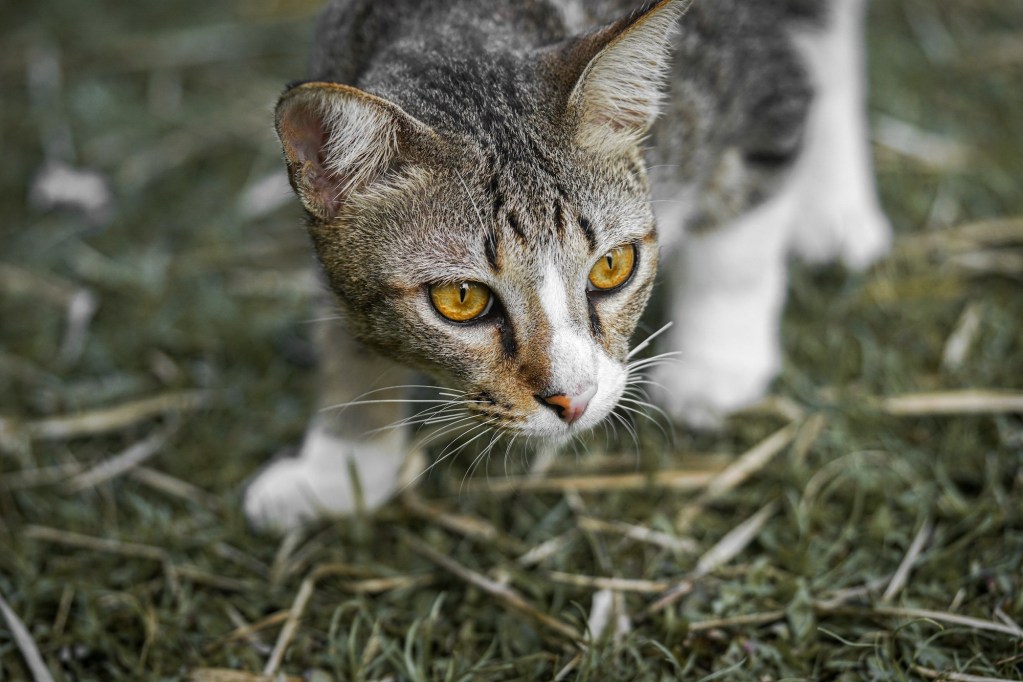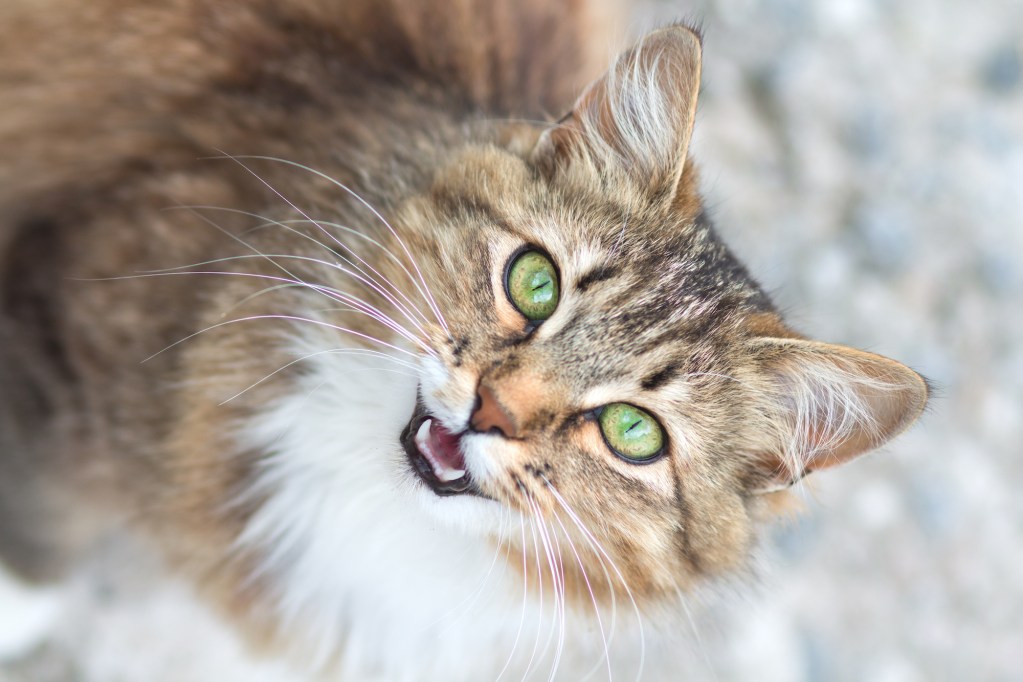
Have you ever spied on your cat looking out the window, crouched and zoned in as if they’re getting ready to hunt? This behavior is common among cats — they’re predators, after all — but some felines even chirp at birds, squirrels, and other small animals. What exactly does this mean? You may hear these chirps and chatters while your furry friend is playing, lounging around, or even in hunting mode, and it’s only natural to have questions.
This one is for cat owners who wonder, “Why do cats chirp at birds?” We’ll review the reasons why kitties make this sound at birds and other small animals, as well as what — if anything — you should do about it. Odds are, these answers will make you smile.
Why do cats chirp at birds?

While there are a few specific reasons why cats chatter at birds, they all come from a deep, predatory instinct. That is to say, this isn’t something your cat simply decides to do. They may learn this behavior from another feline or develop it completely on their own, but this is how they communicate: They chirp and chatter at birds or small animals.
They’re feeling big feelings
If you spend all night lying outside watching the sky for shooting stars, you’ll probably have an excited reaction when you finally spot one. You may even gasp or shout! In the same way, your cat may excitedly chirp at the sight of a bird, chipmunk, or other prey animal.
Mieshelle Nagelschneider, cat behaviorist and founder of The Cat Behavior Clinic, compares this preemptive reaction to when a person’s mouth waters at the sight or smell of something yummy. She explains to Chewy, “The teeth chattering together is the closest the cat can get to having the prey in its mouth and quickly biting down on it.” So, if you hear your cat chirping at a bird, they may just be daydreaming about what it would be like to catch it!
Sometimes, though, your kitty could be chirping out of frustration or puzzlement instead. These sounds can be an indication that your cat would like to go outside to hunt, but Nagelschneider encourages cat owners not to worry about depriving their cats of this instinct. Even in the wild, cats aren’t always successful at catching or even approaching their prey. In fact, this just might be the most exciting part about the hunt — not leaving the prize on your doorstep afterward.
“This activates what is called their ‘seeking circuit,'” explains Nagelschneider, “which is in the reward circuitry of the brain and the best feeling for cats.” In other words, the more challenging the hunt, the more satisfying and fun it can be.
Your cat is mimicking their prey
Cats sometimes chatter at their prey as a way of tricking them into coming closer. By mimicking the bird’s call or the squirrel’s chirps, they may confuse the animal into thinking someone else is nearby. So when the prey moves closer or turns its back, the cat can pounce.
As the feline experts at Chewy explain, this behavior is not exclusive to domestic cats. Big cats like mountain lions and cheetahs are known to chatter at prey, too, proving that this is a deeply rooted, instinctual behavior.
They’re following an instinctual set of hunting actions
When cats hunt, they perform a series of actions called a “prey sequence.” Step one includes staring, hiding, and even chirping. This is what you see when your cat chatters while staring out the window, though some indoor cats may even crouch as if attempting to stalk their prey, which is step two. Outdoor cats are more likely to reach the final steps of the prey sequence: pouncing on the prey, grabbing it, and killing it.
What to do if your cat chirps at birds

If you’ve recently noticed your cat chirping and chattering at their prey, the good news is that it’s totally normal. Actually, it’s a good thing for a cat to engage with their hunting instincts! This is essential physical and mental enrichment for felines, and there’s no need to stop or redirect the behavior. If you were to take away their outlet for hunting instincts, it could lead to pent-up frustration or even aggression.
While chattering itself is a good thing for cats to do, issues may arise if a cat begins to show signs of the prey sequence toward another pet in the home. If you also have a bird as a pet, for example, you may need to keep the animals separated unless you can encourage your cat to chirp, chatter, and hunt when engaged with a toy instead. Feline experts at Chewy suggest increasing the amount of time you play with your cat, especially before a meal when a cat would hunt in the wild.
Remember, this behavior is completely natural and instinctual, even when it seems calculated and purposeful. Cats are born predators, after all, and the sounds they make while hunting are nothing to be concerned about. Happy hunting!



